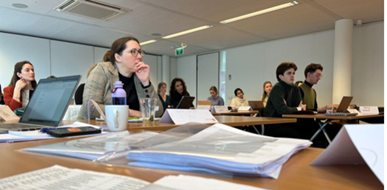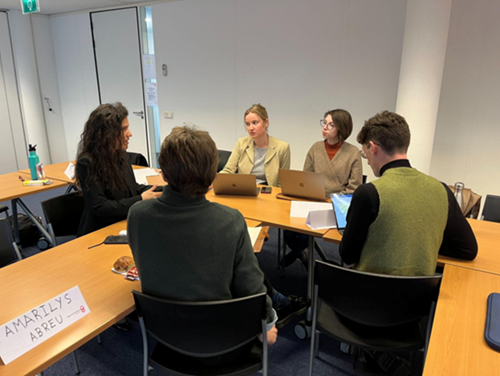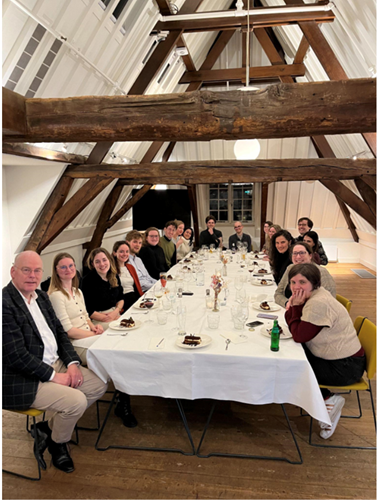PhD Training for 1st and 2nd Year PhD Students 2024
Published 3 April 2024By Emilia Klebanowski and Rory Sugrue

Emilia Klebanowski, Rory Sugrue
NNHRR 2024 PhD Training Days
21-22 March 2024, Utrecht
Emilia Klebanowski (PhD researcher, Radboud University)
Rory Sugrue (PhD researcher, Tilburg University)
Introduction
On the 21st and 22nd of March 2024, the annual NNHRR PhD training for first and second year PhD students took place in Utrecht. This year’s training was kindly hosted by the Open Universiteit, and saw 20 PhD students from seven participating universities in the Netherlands gathering together to learn and to collaborate. Prof Dr Jan Willem Sap opened the training by highlighting the importance of pursuing a PhD, in particular how doctoral researchers tackle some of the biggest challenges facing society with their innovations and knowledge contributions.
From Data to Findings
In the first session, Prof Dr Marijke Malsch gave an introductory session on Empirical Legal Studies in Human Rights Research, exploring the intricacies of qualitative and quantitative studies with a focus on interviewing. Participants learned that interviews are extremely helpful for uncovering new issues and getting a more complete, holistic understanding of the phenomenon under examination. Nonetheless, they can present challenges, since it is oftentimes difficult to get the questions right and researchers should be wary not to ask two-in-one questions. Prof Malsch thus advised to organise mock interviews with other PhDs and supervisors in order to give each other feedback. The session ended with some helpful pointers for relevant future human rights research using Empirical Legal Studies.
A Victory of the Rich?
After a lunch break, Dr Eduardo Arenas Catalán hosted a session on ‘Social Justice, Human Rights Law and Social Rights’. Alongside some insightful book recommendations on human rights, insufficiencies of the human rights law system from a social justice perspective were covered. During the presentation, one quote from Samuel Moyn’s Not Enough: Human Rights in an Unequal World stood out: “the age of human rights has not been kind to full-fledged distributive justice, because it is also an age of the victory of the rich.” The notion of a ‘victory of the rich’ also stayed with participants long afterwards. Dr. Catalán also warned that nothing has changed in the past few years concerning human rights scholarship, and that human rights law is largely unable to curb the commercialisation of public goods. When it comes to conducting research, Dr. Catalán employed an interesting metaphor to showcase a pitfall of legal research: usually researchers only search where the light of a lamp shines, but not the areas where there is no light.
Research Question being your Home
Day 1 of the training ended with a session by Dr Wendy Guns on ‘Why the Research Question Matters’. After giving a personal anecdote of the ups and downs during her PhD trajectory, Dr. Guns highlighted the importance of the research question: the research question is a home, and thus the fundament on which any thesis builds. Apart from the more substantive aspects on focusing your research question as much as you can, the session also provided an opportunity to discuss participants’ research questions in smaller groups where participants received very valuable feedback from our peers. 
What are the tensions in international human rights law?
Day 2 of the training opened with Prof Dr Jan Willem Sap exploring the tensions that exist in international human rights law. Prof Sap did not shy away from posing big questions to the group, such as whether human rights were fundamental to world peace, particularly in a world where human rights are increasingly being instrumentalized for nefarious means. In a society ravaged by conflict and with the rule of law visibly eroding in many regions, participants considered whether human rights frameworks can respond appropriately – if at all. Participants reflected on the obligations placed on states by human rights principles, and the dilemma of whether states should intervene abroad when there are clear and gross violations of human rights occurring. This dilemma is fraught with political considerations of course. Overall, the fallacy of human rights was addressed in this talk, particularly when they are simply codified on paper. Policy change is always needed to bring about actual, societal change. It is this very gap, between law and society, where much human rights research lies.
Human rights measurement is a balancing act
Following on from this rich discussion, Dr Bart Kleine Deters explained how indicators can be used to measure human rights policies, process, and outcomes. There are a number of ways of measuring, for example, counting laws or violations, or even human rights fulfilments; however, the true number is often unobservable or not easily countable. Dr Kleine Deters combined in-depth analysis of education legislation with a statistical impact evaluation for his own PhD research, and perhaps inspired those present to also consider pursuing a mixed-methods approach to their research. The quantitative methods approach provided a refreshing reminder to participants that there are a multitude of ways to conduct valuable human rights research.
A Surprise Guest & Judicial Activism
After lunch, participants were greeted by Prof Dr Jasper Krommendijk, chair of the NNHRR steering committee, who encouraged the researchers to stay active and involved in the network, and pointed to the various NNHRR working groups participants can join. Similarly, there is an annual PhD Forum which provides a great space to present research. In the next session, Prof Dr Carla Zoethout introduced comparative constitutional law, and the methodological challenges therein. Participants canvassed the various ways of interpreting constitutions, from the ‘original purposes’ approach to the ‘living document’ approach. The role of the judiciary in advancing human rights protections was explored with a group exercise consisting of analysing the seminal decisions of Roe v Wade from the US, and the Urgenda climate case in the Netherlands. Participants reflected on the creative ways in which the judiciary can interpret human rights frameworks, and the power of judicial activism.
Say yes, and sometimes no!
To conclude the PhD Training Days, participants had the delight of listening to Nicky Touw who shared the trials, tribulations, and triumphs of doing a PhD. In this honest reflection comprised of insights, advice, experiences – and memes! – participants heard from a PhD candidate nearing the end of her trajectory who provided self-reflective lessons she had learned along the way. Participants were encouraged to make a plan with general directions at the beginning, but to remain ready for various obstacles and pitfalls (as well as opportunities) along the way. One of the most impactful take-aways was the importance of building an academic community, which resonated strongly with the participants, particularly as the training came to an end.
Conclusion
The 2-day PhD training proved invaluable for the participants, offering helpful methodological approaches and insights essential for navigating human rights research. More importantly, it fostered community among those who attended, who will surely cross paths at the next NNHRR event!



